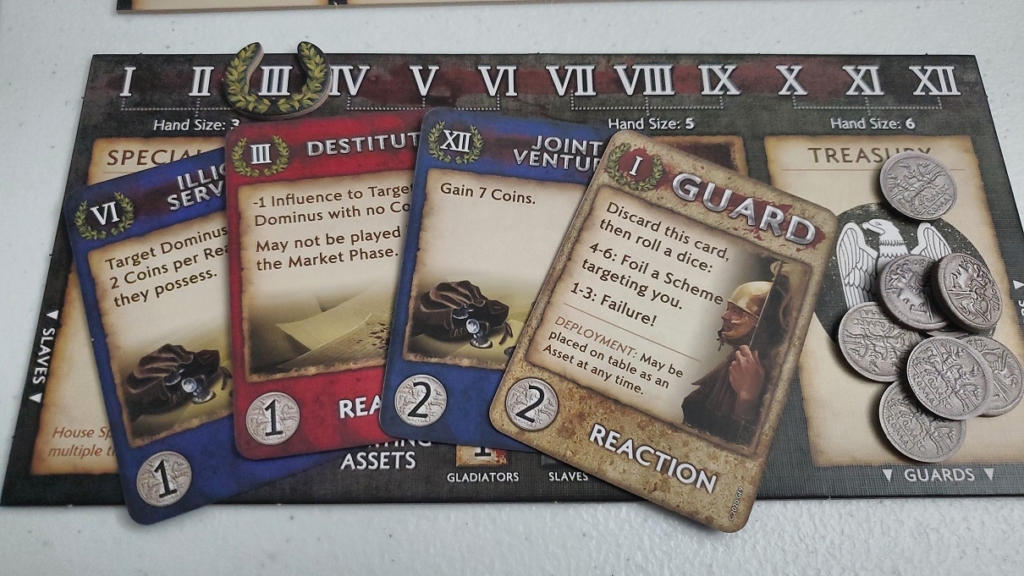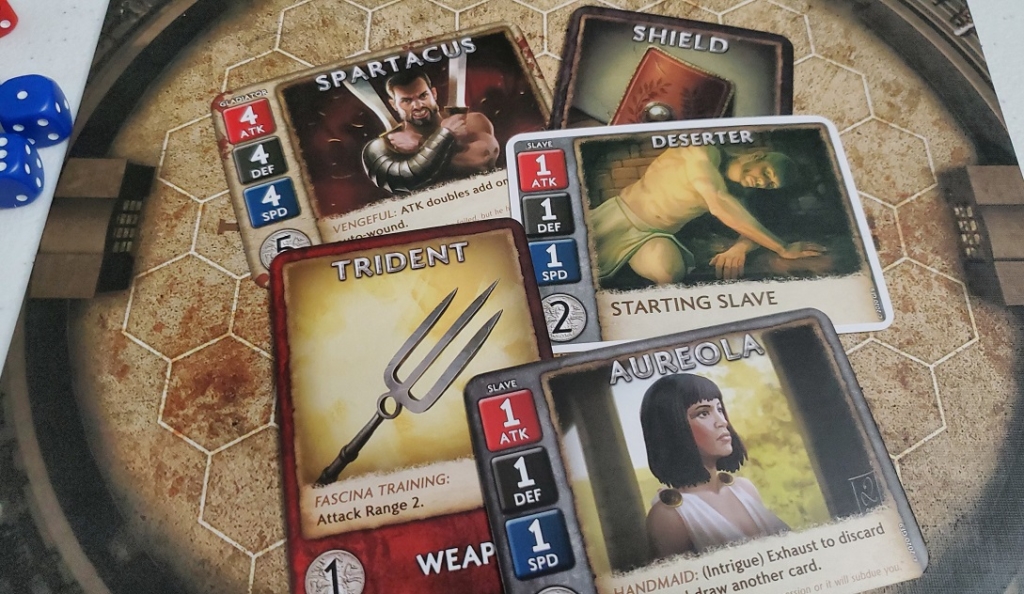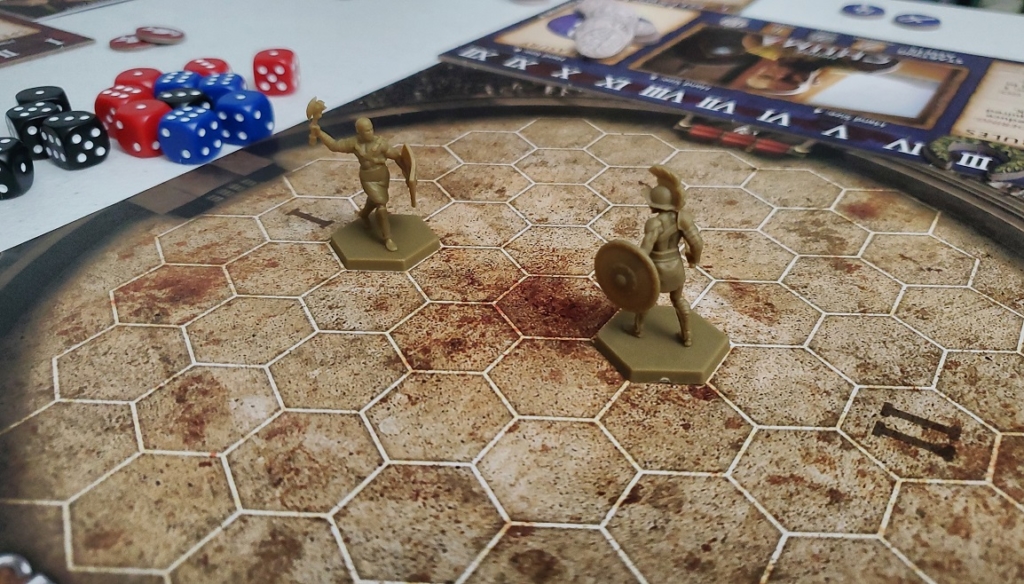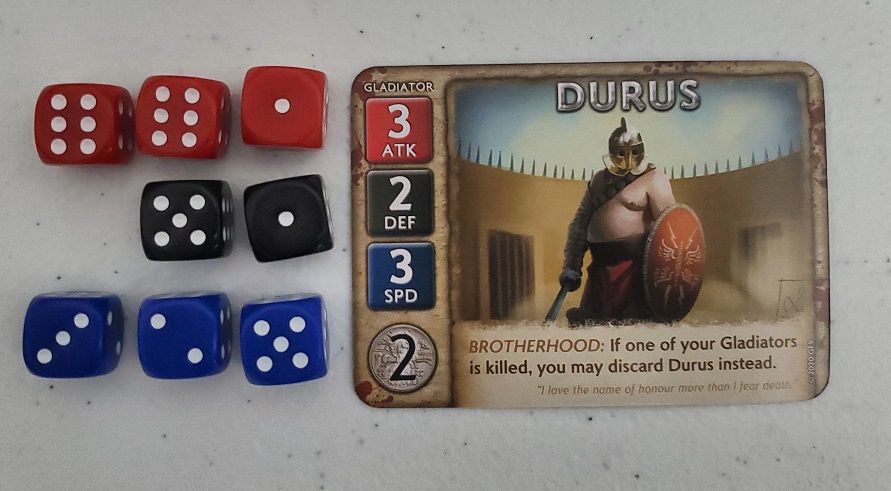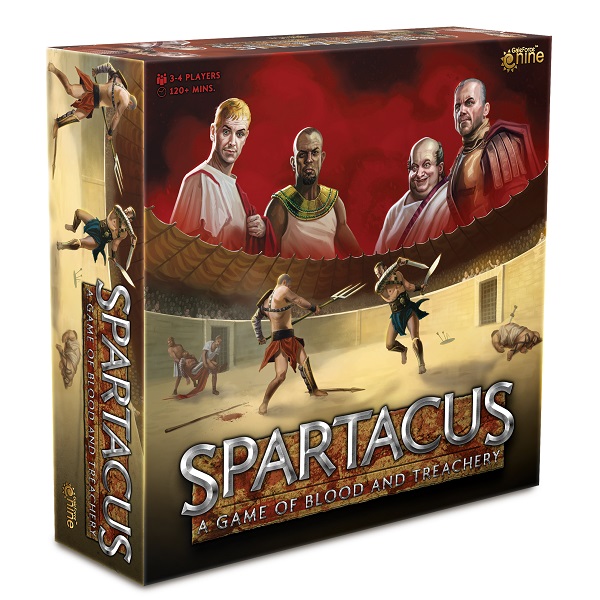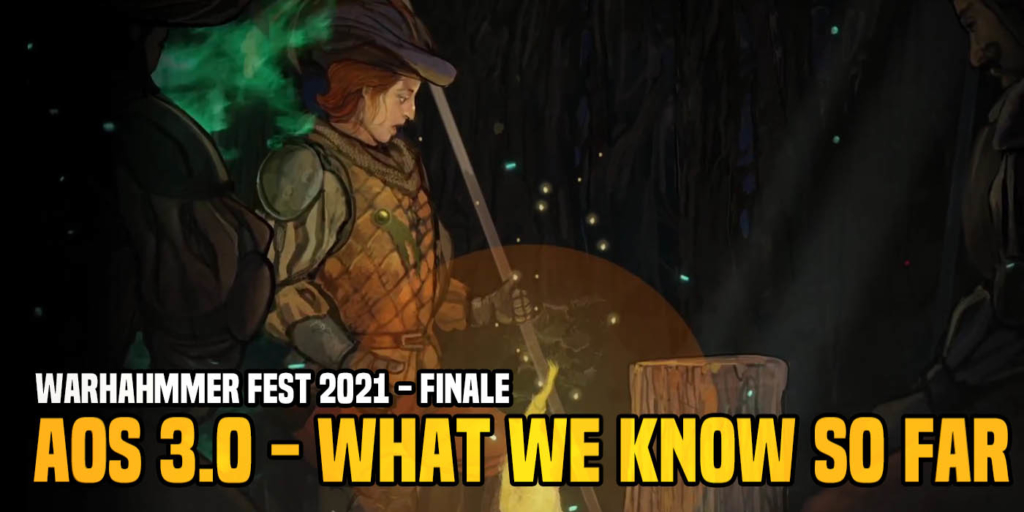GF9’s ‘Spartacus’ Doesn’t Ask You To Hide Your Disloyalty and Betrayal
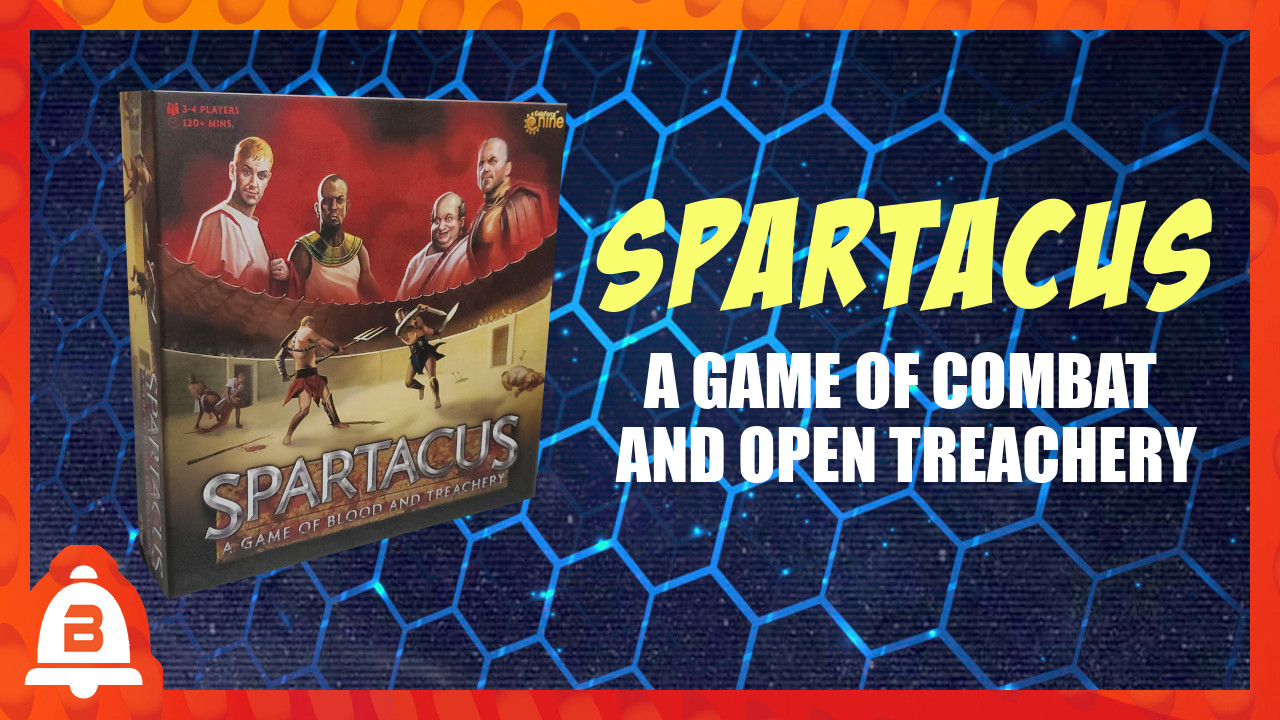
It’s like backstabbing, but in the front!
A lot of people like the idea of hidden role games, with the traitorous backstabbing and deceit. But some people can’t get down with the having to lie. It’s just not in their nature. Well, friends, have I got the game for you!
Spartacus: A Game of Blood and Treachery is not only a game with a great title, but also a competitive half tactical combat game / half resource management economic game. The game is set in the theme of the 2010 show Spartacus. Players take the role of a Dominus, the head of an ancient Roman household. They are each vying to become the most influential house in the city (meaning the first to 12 Influence points). They do through backstabbing, bribery, deceit, and most importantly, by sending their gladiators into the gladiatorial arena.
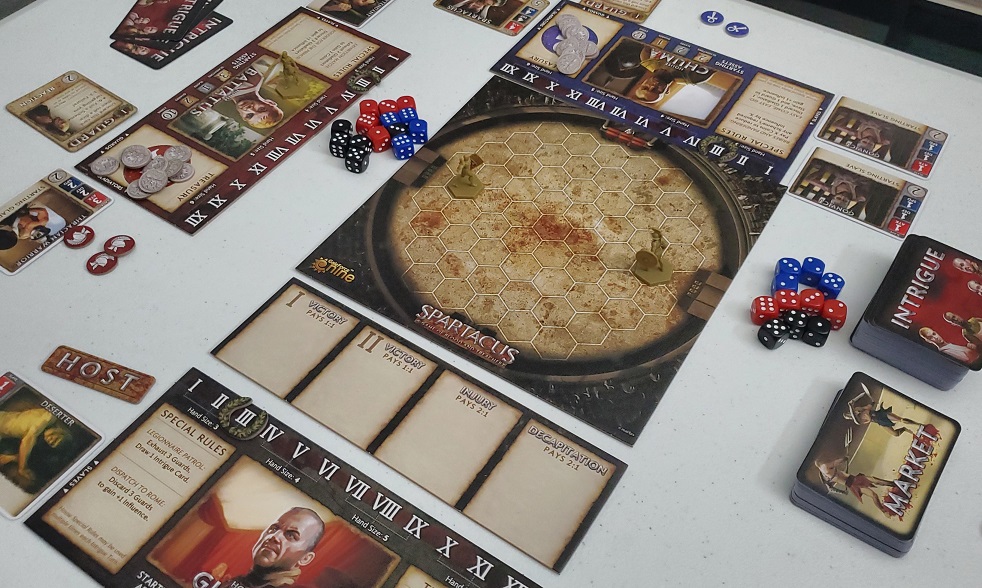 For the record, Spartacus was a great show. Highly recommend. Don’t watch the Syfy version. It’s heavily edited.
For the record, Spartacus was a great show. Highly recommend. Don’t watch the Syfy version. It’s heavily edited.
Gameplay
The overall rules of the game are fairly straightforward. Each round begins with the Intrigue phase. This is where players will play their Intrigue cards. These cards have a huge variety of effects but mostly add influence or money. Each card requires the player to have a certain amount of Influence in order to play it, as noted in the upper left of the card.
If a player doesn’t have enough Influence, they can ask for support from another player. The active player can discuss and come up with any trade they’d like in order to garner support from the other player. Once the support is agreed upon, the deal is made and the active player adds the other player’s Influence to their own when determining which Intrigue cards they can play. But they are not required to play whichever card they were claiming they were planning on playing, making this phase rife with backstabbing.
Players can use their Guards and Reaction cards in order to attempt to foil any scheme which has been set against them, so it’s important to keep a good supply of both on hand at any time.
Next, the Market phase begins and players can openly trade between each other. Once that’s done, players deal out a number of Asset cards from the deck. These cards are gladiators, and weapons and armor for their gladiators, and… well, let’s just call them …workers. These assets are bought through a blind auction. Each player holds a hidden number of coins in their hand and they are revealed simultaneously. Whichever player bid the most, wins the asset.
But once the auctions are done, blind auction bidding for the Host begins. The Host is the player who controls which players will be invited to enter a gladiator arena, which is a key part of the game. The Host can extend an invite to any player, regardless of how well (or poorly) equipped their gladiators are. Since turning down an invite causes that player to lose 1 influence, it’s a great opportunity to extend an invite to a Dominus without a ready combatant, knowing they are likely to decline. Once two combatants have been found, the Arena phase begins and each player makes their bets on who will win.
In this phase, gladiators or very unfortunate …workers will battle. Each combatant can be equipped with a weapon, armor, and special item and they have 3 stats: Attack, Defend, and Speed. Each stat determines how many of those dice they have available.
To make an attack, the attackers rolls their red dice and the defender rolls their black dice. Then both dice are lined up in pairs in numerical order. For each red die which is greater than the black die is it paired with, the defender is wounded and loses a die of their choice from any of the die pools. Once a die pool is empty, the combatant loses and bets are paid out depending on how many die pools they had to empty with the final blow.
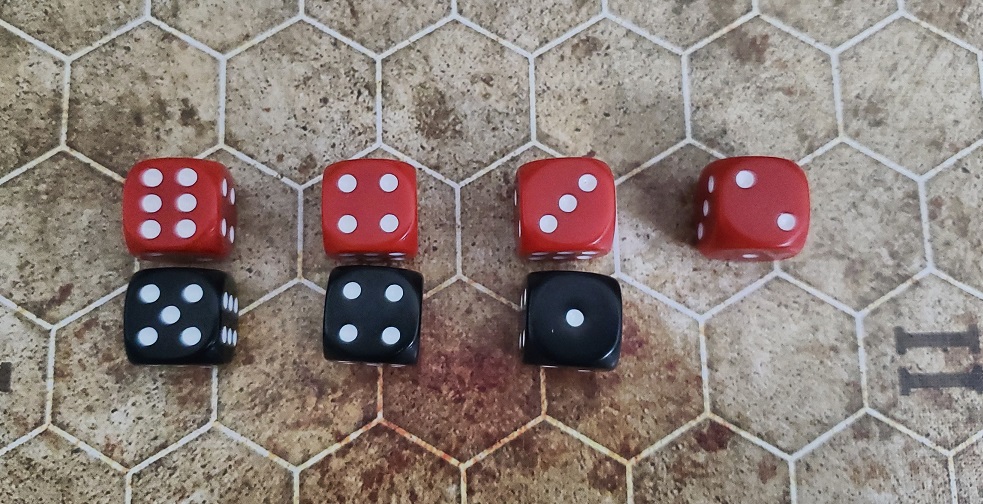 In this example, the defender takes 3 wounds, from the first, third, and fourth dice pairs.
In this example, the defender takes 3 wounds, from the first, third, and fourth dice pairs.
Then the next round begins and it keeps going until one player reaches 12 Influence and they are crowned the winner!
Review
Plainly stated, I like this game a lot.
It has a lot of the aspects I really like in a game. I’m a big fan of arena combat games like Aristeia!, especially when each combatant has unique stats and abilities, and can be equipped as well. Plus each player board has unique abilities, which really allows for tons of strategies and ways to play. This is a second printing of the game, which originally had a couple expansions. So I’m am hoping they get re-released as well.
As I said up top, this game feels like a great middle-ground for people who like the backstabbing aspects of some games, but don’t like the idea of having to lie their way out of accusations in order to avoid being eliminated, like so many of those games do. Since everyone is just openly scheming against each other, that aspect of that style of game is totally eliminated. Plus, it gives way to the best rules section of any game ever.
Overall, Spartacus is a pretty lengthy game, but since gameplay is well broken up between the intrigue, market and arena phases. So it never feels like it’s stagnant. Players should expect to be targeted a lot throughout. So, play it with the mindset of just having fun and you got yourself a great time.
8/10
Spartacus: Blood and Treachery – $50 – Available Now
Fight for dominance through a combination of political schemes and glorious battles. As Dominus, you have a variety of resources at your disposal. Guards to protect you from schemes launched by your rivals and slaves to run your household. Your Gladiators compete to bring glory to themselves and influence to their Dominus.
- 3 – 4 Players
- 120 – 180 Minutes
- Ages 17+
Thanks for watching!

